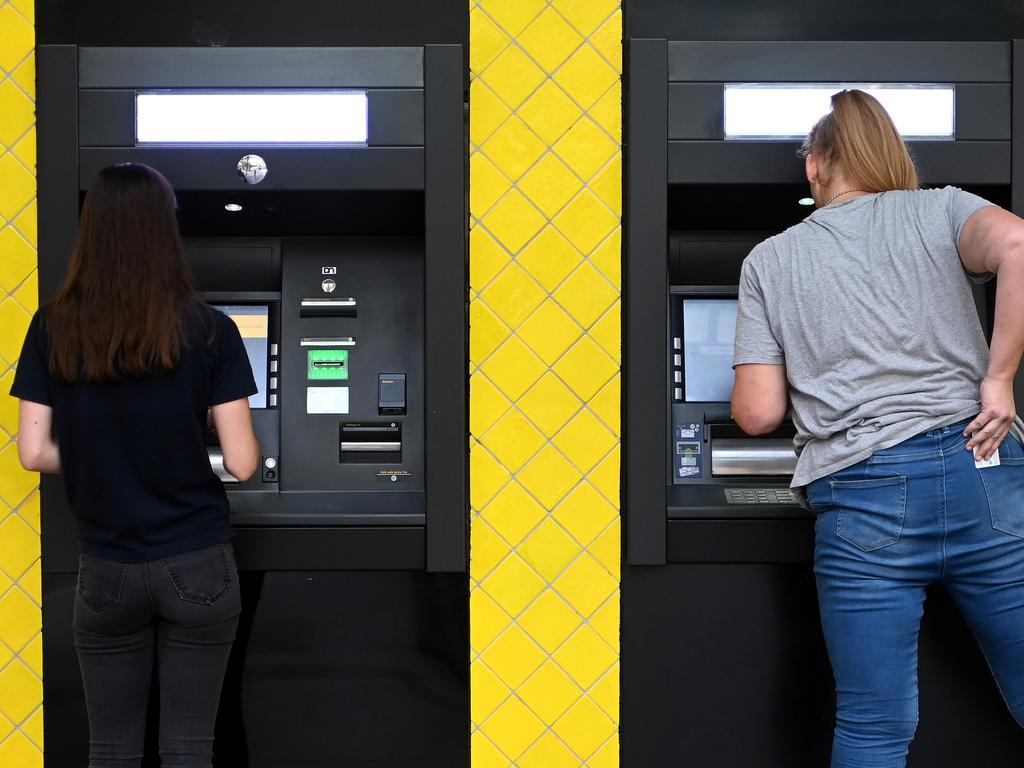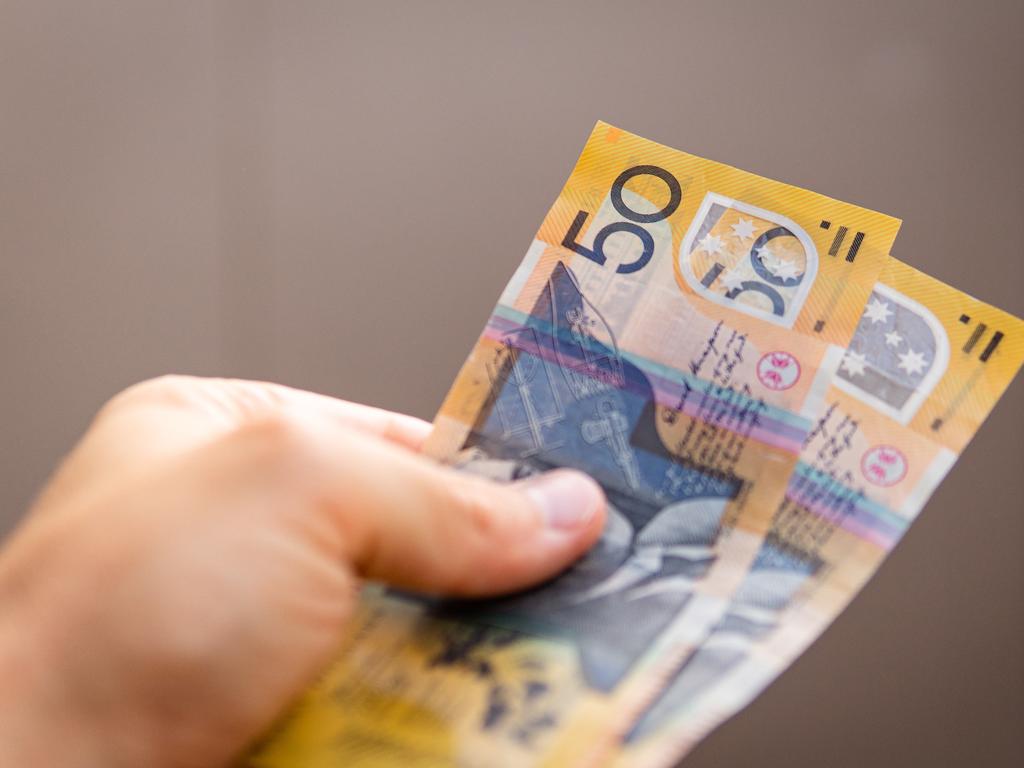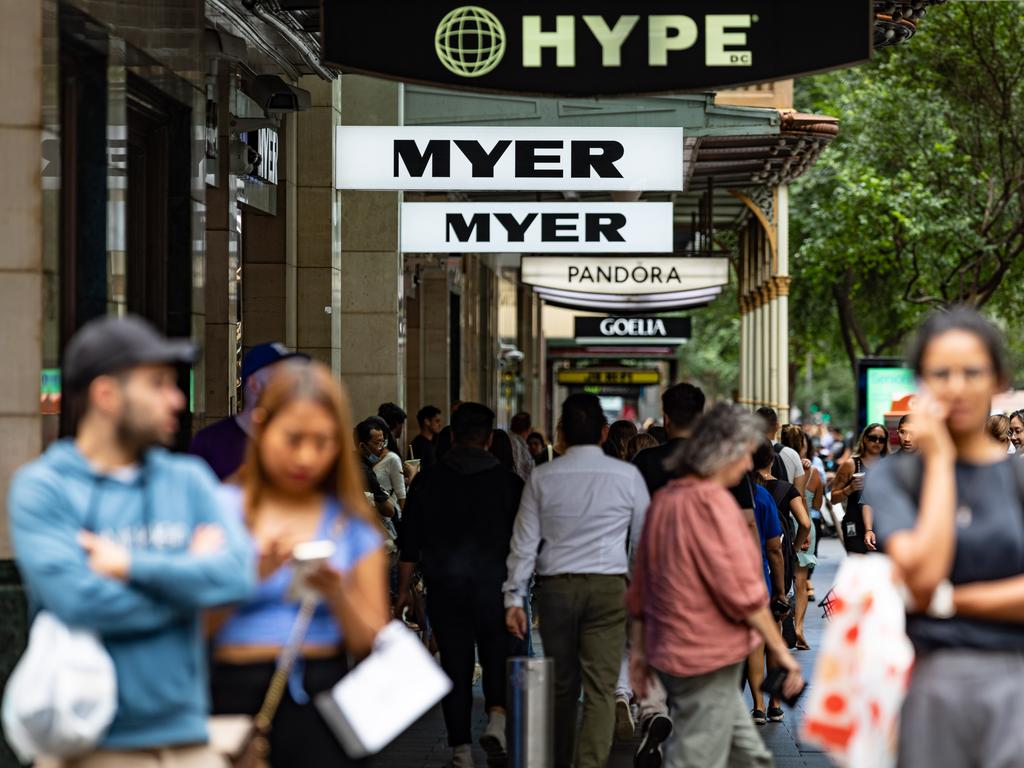Australia to be ‘functionally cashless’ by 2025
Australia is rapidly heading towards a “cashless society”, with one expert predicting physical money will be completely gone by the end of the decade.

Australia is rapidly heading towards becoming a “cashless society” as banks crack down on withdrawals, close ATMs and branches and ban cash altogether — with one expert predicting physical money will be completely gone by the end of the decade.
“I’d say we’ll be functionally cashless by the end of 2025 — it’ll just be a complete rarity,” said Richard Holden, professor of economics at UNSW Business School.
“But unless the government gets involved to accelerate the process I think we’ll be actually cashless by 2030.”
Macquarie Bank this week announced it would be phasing out cash altogether next year, following similar moves by Commonwealth Bank, NAB and ANZ to stop handling cash in a few branches.
The shock announcement comes after banks’ efforts to make it more difficult for customers to transact in cash have sparked backlash in recent months.
In response, another money expert has warned Australia’s banks could soon start “cash rationing” at ATMs.
Finance expert Sarah Wells said they may make the move because of the lower demand for banknotes.
She predicted this could mean limits for ATM withdrawals and that customers could even be restricted from withdrawing funds from automatic teller machines other banks operated.
“There is the possibility that as we reduce the demand for cash, or reduce the availability of cash, then there’s going to be limited amounts of actual, physical cash held,” Ms Wells told The Daily Mail.
Cash rationing is where banks only hold limited amounts of physical money in their ATMs.
In July, a pro poker player slammed Westpac for a “totalitarian experience” after his account was blocked following a “very modest” cash deposit, claiming the fraud team refused to unblock his account unless he “adequately explained these funds” which he told them was “none of their business”.
Others have expressed frustration at being grilled by bank tellers when trying to withdraw more than $2000 in cash — a policy intended to uncover money laundering or other criminal activity.
Last month, an Aussie comedian filmed himself giving a series of outlandish reasons why he was withdrawing $6000 in a viral TikTok video.
“Drugs, coke, the devil’s lettuce, you would know,” Jon-Bernard Kairouz told one teller.

The death of cash
There’s no denying the numbers look bad for the future of cash.
Australian Bureau of Statistics (ABS) data shows a dramatic drop in ATM use in recent years, down from 78 million withdrawals in December 2008 to only 30 million in June this year.
According to the Finance Sector Union (FSU), between June 2017 and June 2022 more than 1600 bank branches were closed, with a disproportionate number located in regional Australia.
Reserve Bank of Australia (RBA) figures show the majority of transactions in Australia are now made using electronic payment methods rather than cash, and cheques are now “rarely used”.
However the use of cash has ticked up slightly after Covid, with an RBA survey finding cash was used in 27 per cent of in-person transactions in 2021, compared with 23 per cent in 2020.
ATM cash withdrawals and banknote deposits have similarly increased from their pandemic lockdown lows.
The pandemic also saw more businesses refusing cash altogether, although cash acceptance remains high overall at 94 per cent in June 2022, from 99 per cent in February 2020, according to the RBA.
“Despite the ongoing decline in the use of cash for transactions, a significant minority of face-to-face payments are still made in cash and some members of the community prefer to use cash for their everyday payments,” the RBA said in its 2022 Payments System Board annual report.
“Older Australians, for example, tend to use cash more frequently on average than people in other age groups.”
The RBA also notes that while Australians are using cash less frequently for transactions, overall demand for cash remains strong.
“The value of banknotes in circulation grew particularly strongly during the pandemic, with circulation growing by 23 per cent from December 2019 to December 2021,” it said.
“Much of the increase in demand was for high-denomination banknotes ($50s and $100s), suggesting that many people in the community continue to view holding banknotes as desirable for precautionary (i.e. emergency) or store-of-wealth purposes, especially in times of economic uncertainty.”
A recent survey of nearly 1100 people by comparison website Finder found 55 per cent of Australians use cash less than once per week, 14 per cent only a few times a year and 13 per cent never using it at all.
“We may never be a 100 per cent cashless society, but any society where you can do 95 per cent of your day-to-day business without cash is as close to cashless as making no odds,” said Finder head of consumer research Graham Cooke.
“With the increasing uptake of plastic across small shops, food vans and even Big Issue sellers, Aussies are finding that the convenience of carrying a card — or just your phone — is preferable to lugging around pocketfuls of coins. This is especially true in Sydney, where you can use the same phone to pay for public transport.”
Mr Cooke warned that this was “not necessarily a positive move”, as many businesses still charge a fee for accepting credit or debit cards “allegedly to cove the cost of the transaction”.
“This, however, ignores the significant costs of handling cash,” he added.
“The UK’s move of banning any transaction surcharges no matter what payment method is used could be the way to go for Australia. For those looking to reduce fees, Eftpos cards are often cheaper to use, and less risky, than credit.”

‘Cash never goes down’
Chris Vasantkumar, a lecturer at Macquarie University whose research includes the “anthropology of cash and cashlessness”, argues cash is “unlikely to go away completely”.
“While most Australians use far less cash than they did 20 years ago, the idea of having cash to fall back on remains very important,” he said in an email.
“There are a number of reasons for this. First, it’s pretty easy to replace cash as a medium of exchange (using it to buy and sell things) but harder to replace it as a store of value (stuffing it in the proverbial mattress).”
Dr Vasantkumar said there were serious issues to consider at both a personal and societal level.
“On a personal level, some folks (indeed some societies) have serious concerns about lack of privacy — this is the flip side of a popular argument for moving to cashless transactions — decreased crime as a result of increased transparency,” he said.
“But one person’s transparency is another person’s surveillance. How much information about our economic behaviour are we comfortable giving up? Different countries answer this question in different ways. Germans, for example, still strongly prefer cash (especially in the east) due to negative past experiences with state surveillance.”
More broadly, Dr Vasantkumar suggested an issue less often considered with going cashless was “in some ways a kind of privatisation of what used to be a public asset — money itself”.
“The kind of money we’re generally used to, standard currency issued by states (or by banks tapped by states to issue it on their behalf) is a public good like a healthcare system — accessible equally by all and ideally not a source of profit,” he said.
“Going cashless moves transactions out of this sphere into a world where you are always relying on privately held banking infrastructures to buy and sell things and someone is making money off your transactions (e.g., debit and credit card transaction fees). We wouldn’t usually think about this as similar to selling off the power grid but in some ways it really is.”
Thirdly, he noted there were real concerns about the durability and dependability of the payments infrastructure itself.
Periodic outages affecting banks’ IT systems have in the past seen Aussies stuck at the checkout unable to pay for fuel, groceries and bills.
“Cash never goes down,” Dr Vasantkumar said.

‘No right to use cash’
Prof Holden, however, insists “we’re headed towards a cashless society — the only question is how rapidly”.
“Another way of putting it is how long the last vestiges of cash are going to hang around for, because in many ways we’re pretty close to being cashless,” he said.
“Australia is pretty high up in the world stakes of not using cash very much. ATMs are disappearing, branches have been closing for a long time, it’s harder to get your hands on cash and there’s less and less need to. Australia’s point-of-sale technology is world-class.”
Tap-and-go cards, Apple Pay and Google Pay have been around for several years and the introduction of the New Payments Platform in 2018 “allowed people to instantaneously and freely transfer money to anyone with PayID”.
“It’s super easy for grandparents to give the grandkids money for their birthday, pay a babysitter or split a restaurant bill,” Prof Holden said.
“The question is, is the government or the RBA going to kick things along to accelerate [the phase-out of cash].”
Prof Holden argued there were very few genuine use cases for cash “other than illicit acts or people who want to use cash to hide things from people”.
“When I talk about this on the radio there is always someone who calls up and says something like, ‘But when I go and use a prostitute I don’t want my wife seeing my bank statement,’” he said.
“That’s not a good use case. This is not a sympathetic argument.”
For the very small number of people who genuinely have a need for cash, such as elderly people not able to use digital banking, “that can be handled”. “Ten years ago people said, ‘What about kids with tuckshops?’” he said.
“Today most primary school tuckshops are digital or almost exclusively digital. You can load $10 onto their tap card.”
He rejected the libertarian position that people have a right to use physical currency free from government snooping, arguing there was a “real cost” to cash that everyone had to pay for.
“Take a local cafe — if they’re taking bundles of cash they’ve got to have insurance for that, got to create a float in the morning, bundle it up at the end of the day, put it in a night safe,” he said.
“That all costs money, and it adds to the price or your sandwich or coffee. People don’t have a right to something that everyone else has to pay for. People have a right to healthcare, education, but people don’t have a right to a means of payment when there’s a perfectly viable alternative.”






